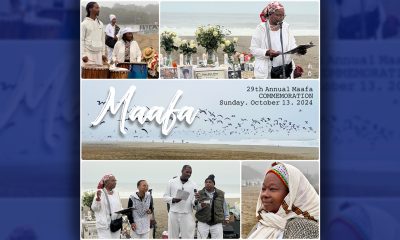National
Baltimore’s Prosecutor Faces Big Test 4 Months Into Job

In this Feb, 6, 2015 photo, States Attorney Marilyn Mosby speaks at a news conference, in Baltimore. Baltimores chief prosecutor is 35 years old, has been on the job for less than four months, and is about to take on the biggest challenge of her career weighing the evidence against six police officers in the death of Freddie Gray and deciding whether they deserve to be criminally charged. (Kim Hairston/The Baltimore Sun via AP)
Ben Nuckols and Amanda Lee Myers, ASSOCIATED PRESS
BALTIMORE (AP) — Baltimore’s chief prosecutor, just 35 years old and on the job for less than four months, is facing the biggest challenge of her career: deciding whether evidence supports criminal charges against police officers in the death of Freddie Gray.
State’s Attorney Marilyn Mosby ousted an established white opponent by promising to hold police accountable. She accused him of being too cozy with officers and too out of touch with the citizens of Baltimore. Mosby and her husband, a Baltimore city councilman, are black and live just blocks from the poverty-stricken community where riots broke out Monday following Gray’s funeral.
But even her supporters say Mosby’s close ties to the community won’t save her from criticism.
“She better be ready. It’s going to be baptism by fire,” said J. Wyndal Gordon, a longtime defense attorney in Baltimore who has litigated against officers in excessive-force cases. “How she will handle this will define her administration and the future of that office.”
Six officers have been suspended with pay while Mosby decides what to do. Police gave her their internal report Thursday, but her office is conducting its own investigation. She has not announced a timetable for her decision. The state medical examiner’s office said Friday that it had given her office the autopsy report and that it will not release it publicly while the case is under investigation.
Mosby grew up in Boston and met her husband, Councilman Nick Mosby, while they were students at Tuskegee University in Alabama. After clerking at U.S. Attorney’s offices in Boston and Washington, she joined the Baltimore State’s Attorney’s Office in 2005 and moved up the ranks before leaving to work for an insurance company. She defeated incumbent Gregg Bernstein, who outraised her three-to-one, in last June’s Democratic primary, and faced only write-in opposition in the general election.
Her official biography declares that “she is the youngest chief prosecutor of any major city in America.”
“I think it’s very unique that a chief prosecutor who — as young as she is, who lives in a community that has a high amount of violence — that’s very unique and she’s probably the only one in the entire country,” Nick Mosby said. “She’s from the inner city, she lives in the inner city, she knows the inner city.”
Mosby has three legal options: charge the officers, decline to charge them or seek a grand jury indictment.
Practically speaking, she is almost certain to seek an indictment, said Andrew Levy, a Baltimore defense attorney and an adjunct professor at the University of Maryland School of Law.
Charging the officers without going to a grand jury would require Mosby’s office to persuade a judge that there is probable cause that a crime was committed, a procedural step prosecutors often avoid in high-profile cases. Declining to charge the officers could be seen as a betrayal by the protesters who have flooded city streets since Gray’s death.
Mosby could present a grand jury with a menu of potential charges including assault, involuntary or voluntary manslaughter, or even murder. Juries in Baltimore criminal trials tend to be distrustful of police officers, an attitude that could work in Mosby’s favor if she decides the officers committed crimes.
“The conventional wisdom would be that a Baltimore city grand jury would not be reluctant to indict a police officer,” Levy said.
Some of her critics say her campaign pledges and political success could compromise justice in the Gray case.
Warren Brown, a veteran Baltimore defense attorney who supported Mosby’s opponent, said the prosecutor’s decision would be inextricably linked to her and her husband’s political aspirations. He said Mosby is being pressured to indict the officers on murder or voluntary manslaughter charges in Gray’s death, which he doesn’t think the evidence supports.
“She is a politician; her husband is a politician. This is a watershed event,” Brown said. “There’s a lot of collateral damage if she does not indict. For her and her husband, they would be drummed out of office. There’s no way they could survive in the city, let alone ask people to vote for them at a later date. She’s going to find a way.”
Brown and Ivan Bates, a former prosecutor and a current defense attorney in Baltimore, both expressed concerns about Mosby’s ties to the attorney representing Gray’s family, Billy Murphy.
Murphy was among Mosby’s biggest campaign contributors last year, donating the maximum individual amount allowed, $4,000, in June. He was also on Mosby’s transition team after the election, and Bates described him as a mentor to her.
“I think she has too much pressure to not indict, from the pressure of her husband’s constituents, of her mentor Billy Murphy, and of the pressure of making sure she wants to hold on to her job in four years,” Bates said. “She’s going to feel the need to indict.”
Mosby’s office did not respond to interview requests. In a statement Thursday, she said her office was still investigating and pleaded with the public for patience.
When she was elected in November, Mosby told The Daily Record newspaper she was excited for the opportunity “to change what has happened in the community.”
“I’m living out my dream to reform the criminal justice system,” said Mosby, whose parents and grandfather were all police officers.
Mayor Stephanie Rawlings-Blake expressed confidence in Mosby on Thursday, while also welcoming a separate investigation by the U.S. Justice Department, now led by Attorney General Loretta Lynch.
“If, with the nation watching, three black women at three different levels can’t get justice and healing for this community, you tell me where we’re going to get it in our country,” the mayor said.
Mosby’s record in high-profile cases has been mixed thus far.
In January, the morning after she was sworn into office, she announced manslaughter charges against an Episcopal bishop in the hit-and-run death of a cyclist. The bishop, Heather Cook, had not even been arrested when Mosby told a packed news conference that Cook had been drunkenly text-messaging at the time of the crash.
Mosby failed, however, to obtain a third trial for a man accused in the slaying of a teenage honor student from North Carolina. Defense attorneys said the re-indictment violated Constitutional protections against double jeopardy, and a judge threw it out. Her office is pursuing an appeal.
Mosby was also criticized for firing several veteran prosecutors, some of them in the middle of trials. But she drew praise from lawyers for her leadership team.
Clergy protesting at her office Wednesday afternoon said they have faith in the prosecutor, but they are demanding swift justice and transparency.
“I support Marilyn Mosby. But now we have to step up and do what we ran on,” said the Rev. Delman Coates, a liberal activist who ran last year for Maryland lieutenant governor. “It’s about substance, not symbolism. It’s not about campaign slogans. It’s about delivering for the people.”
___
Follow Ben Nuckols on Twitter at https://twitter.com/APBenNuckols.
Follow Amanda Lee Myers on Twitter at https://twitter.com/AmandaLeeAP.
Copyright 2015 The Associated Press. All rights reserved. This material may not be published, broadcast, rewritten or redistributed.
###
Arts and Culture
In ‘Affrilachia: Testimonies,’ Puts Blacks in Appalacia on the Map

By Terri Schlichenmeyer
The Bookworm Sez
An average oak tree is bigger around than two people together can reach.
That mighty tree starts out with an acorn the size of a nickel, ultimately growing to some 80 feet tall, with a canopy of a hundred feet or more across.
And like the new book, “Affrilachia” by Chris Aluka Berry (with Kelly Elaine Navies and Maia A. Surdam), its roots spread wide and wider.
Affriclachia is a term a Kentucky poet coined in the 1990s referring to the Black communities in Appalachia who are similarly referred to as Affrilachians.
In 2016, “on a foggy Sunday morning in March,” Berry visited Affrilachia for the first time by going the Mount Zion AME Zion Church in Cullowhee, North Carolina. The congregation was tiny; just a handful of people were there that day, but a pair of siblings stood out to him.
According to Berry, Ann Rogers and Mae Louise Allen lived on opposite sides of town, and neither had a driver’s license. He surmised that church was the only time the elderly sisters were together then, but their devotion to one another was clear.
As the service ended, he asked Allen if he could visit her. Was she willing to talk about her life in the Appalachians, her parents, her town?
She was, and arrangements were made, but before Barry could get back to Cullowhee, he learned that Allen had died. Saddened, he wondered how many stories are lost each day in mountain communities where African Americans have lived for more than a century.
“I couldn’t make photographs of the past,” he says, “but I could document the people and places living now.”
In doing so he also offers photographs that he collected from people he met in ‘Affrilachia,’ in North Carolina, Georgia, Kentucky, and Tennessee, at a rustic “camp” that was likely created by enslaved people, at churches, and in modest houses along highways.
The people he interviewed recalled family tales and community stories of support, hardship, and home.
Says coauthor Navies, “These images shout without making a sound.”
If it’s true what they say about a picture being worth 1,000 words, then “Affrilachia,” as packed with photos as it is, is worth a million.
With that in mind, there’s not a lot of narrative inside this book, just a few poems, a small number of very brief interviews, a handful of memories passed down, and some background stories from author Berry and his co-authors. The tales are interesting but scant.
For most readers, though, that lack of narrative isn’t going to matter much. The photographs are the reason why you’d have this book.
Here are pictures of life as it was 50 years or a century ago: group photos, pictures taken of proud moments, worn pews, and happy children. Some of the modern pictures may make you wonder why they’re included, but they set a tone and tell a tale.
This is the kind of book you’ll take off the shelf, and notice something different every time you do. “Affrilachia” doesn’t contain a lot of words, but it’s a good choice when it’s time to branch out in your reading.
“Affrilachia: Testimonies,” by Chris Aluka Berry with Kelly Elaine Navies and Maia A. Surdam
c.2024, University of Kentucky Press, $50.00.
Black History
Alice Parker: The Innovator Behind the Modern Gas Furnace
Born in Morristown, New Jersey, in 1895, Alice Parker lived during a time when women, especially African American women, faced significant social and systemic barriers. Despite these challenges, her contributions to home heating technology have had a lasting impact.

By Tamara Shiloh
Alice Parker was a trailblazing African American inventor whose innovative ideas forever changed how we heat our homes.
Born in Morristown, New Jersey, in 1895, Parker lived during a time when women, especially African American women, faced significant social and systemic barriers. Despite these challenges, her contributions to home heating technology have had a lasting impact.
Parker grew up in New Jersey, where winters could be brutally cold. Although little is documented about her personal life, her education played a crucial role in shaping her inventive spirit. She attended Howard University, a historically Black university in Washington, D.C., where she may have developed her interest in practical solutions to everyday challenges.
Before Parker’s invention, most homes were heated using wood or coal-burning stoves. These methods were labor-intensive, inefficient, and posed fire hazards. Furthermore, they failed to provide even heating throughout a home, leaving many rooms cold while others were uncomfortably warm.
Parker recognized the inefficiency of these heating methods and imagined a solution that would make homes more comfortable and energy-efficient during winter.
In 1919, she patented her design for a gas-powered central heating system, a groundbreaking invention. Her design used natural gas as a fuel source to distribute heat throughout a building, replacing the need for wood or coal. The system allowed for thermostatic control, enabling homeowners to regulate the temperature in their homes efficiently.
What made her invention particularly innovative was its use of ductwork, which channeled warm air to different parts of the house. This concept is a precursor to the modern central heating systems we use today.
While Parker’s design was never fully developed or mass-produced during her lifetime, her idea laid the groundwork for modern central heating systems. Her invention was ahead of its time and highlighted the potential of natural gas as a cleaner, more efficient alternative to traditional heating methods.
Parker’s patent is remarkable not only for its technical innovation but also because it was granted at a time when African Americans and women faced severe limitations in accessing patent protections and recognition for their work. Her success as an inventor during this period is a testament to her ingenuity and determination.
Parker’s legacy lives on in numerous awards and grants – most noticeably in the annual Alice H. Parker Women Leaders in Innovation Award. That distinction is given out by the New Jersey Chamber of Commerce to celebrate outstanding women innovators in Parker’s home state.
The details of Parker’s later years are as sketchy as the ones about her early life. The specific date of her death, along with the cause, are also largely unknown.
Activism
U.S. House Minority Leader Hakeem Jeffries Speaks on Democracy at Commonwealth Club
Based on his first speech as House minority leader, “The ABCs of Democracy” by Grand Central Publishing is an illustrated children’s book for people of all ages. Each letter contrasts what democracy is and isn’t, as in: “American Values over Autocracy”, “Benevolence over Bigotry” and “The Constitution over the Cult.”

By Linda Parker Pennington
Special to The Post
House Minority Leader Hakeem Jeffries addressed an enthusiastic overflow audience on Monday at San Francisco’s Commonwealth Club, launching his first book, “The ABCs of Democracy.”
Based on his first speech as House minority leader, “The ABCs of Democracy” by Grand Central Publishing is an illustrated children’s book for people of all ages.
Each letter contrasts what democracy is and isn’t, as in: “American Values over Autocracy”, “Benevolence over Bigotry” and “The Constitution over the Cult.”
Less than a month after the election that will return Donald Trump to the White House, Rep. Jeffries also gave a sobering assessment of what the Democrats learned.
“Our message just wasn’t connecting with the real struggles of the American people,” Jeffries said. “The party in power is the one that will always pay the price.”
On dealing with Trump, Jeffries warned, “We can’t fall into the trap of being outraged every day at what Trump does. That’s just part of his strategy. Remaining calm in the face of turmoil is a choice.”
He pointed out that the razor-thin margin that Republicans now hold in the House is the lowest since the Civil War.
Asked what the public can do, Jeffries spoke about the importance of being “appropriately engaged. Democracy is not on autopilot. It takes a citizenry to hold politicians accountable and a new generation of young people to come forward and serve in public office.”
With a Republican-led White House, Senate, House and Supreme Court, Democrats must “work to find bi-partisan common ground and push back against far-right extremism.”
He also described how he is shaping his own leadership style while his mentor, Speaker-Emeritus Nancy Pelosi, continues to represent San Francisco in Congress. “She says she is not hanging around to be like the mother-in-law in the kitchen, saying ‘my son likes his spaghetti sauce this way, not that way.’”
-

 California Black Media4 weeks ago
California Black Media4 weeks agoCalifornia to Offer $43.7 Million in Federal Grants to Combat Hate Crimes
-

 Black History4 weeks ago
Black History4 weeks agoEmeline King: A Trailblazer in the Automotive Industry
-

 California Black Media4 weeks ago
California Black Media4 weeks agoGov. Newsom Goes to Washington to Advocate for California Priorities
-

 California Black Media4 weeks ago
California Black Media4 weeks agoCalifornia Department of Aging Offers Free Resources for Family Caregivers in November
-

 Activism3 weeks ago
Activism3 weeks agoOakland Post: Week of November 27 – December 3, 2024
-

 Activism4 weeks ago
Activism4 weeks agoOCCUR Hosts “Faith Forward” Conference in Oakland
-

 Activism4 weeks ago
Activism4 weeks agoRichmond Seniors Still Having a Ball After 25 Years
-

 Activism2 weeks ago
Activism2 weeks agoButler, Lee Celebrate Passage of Bill to Honor Congresswoman Shirley Chisholm with Congressional Gold Medal






















































